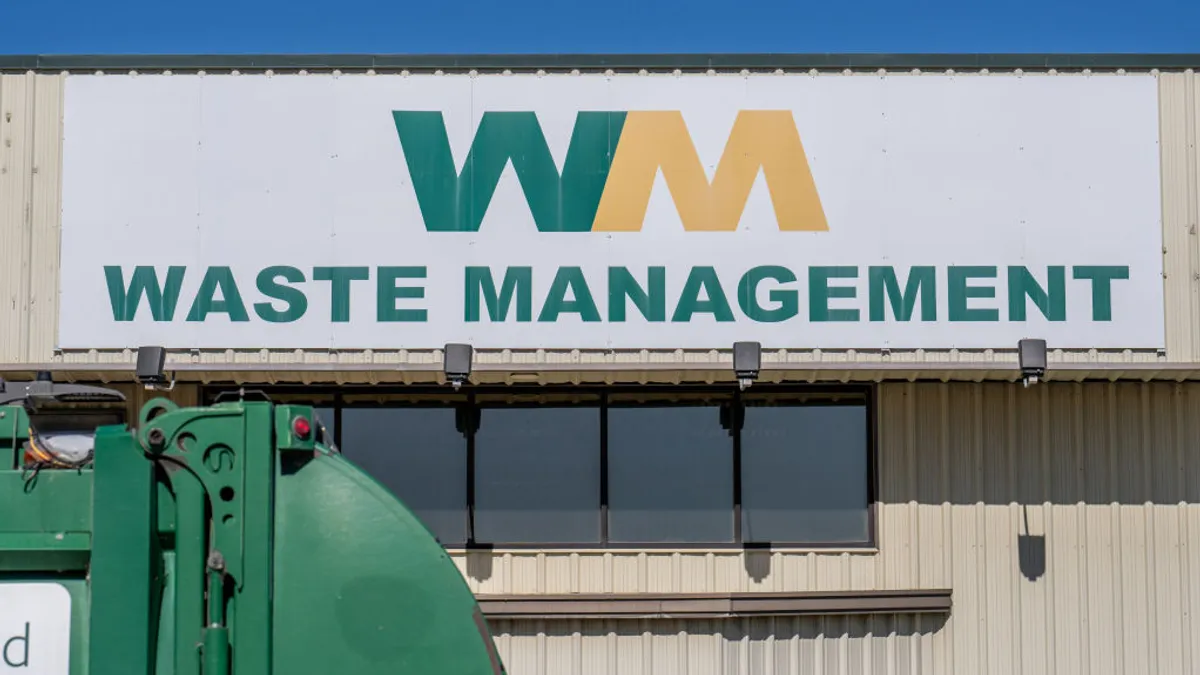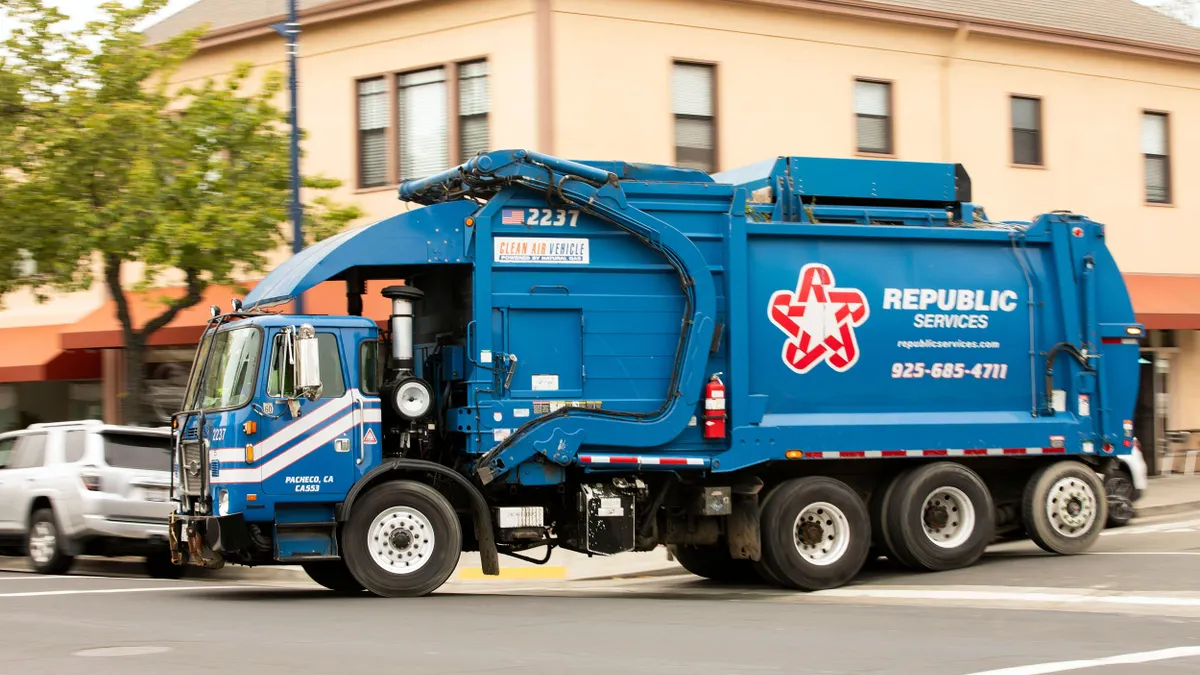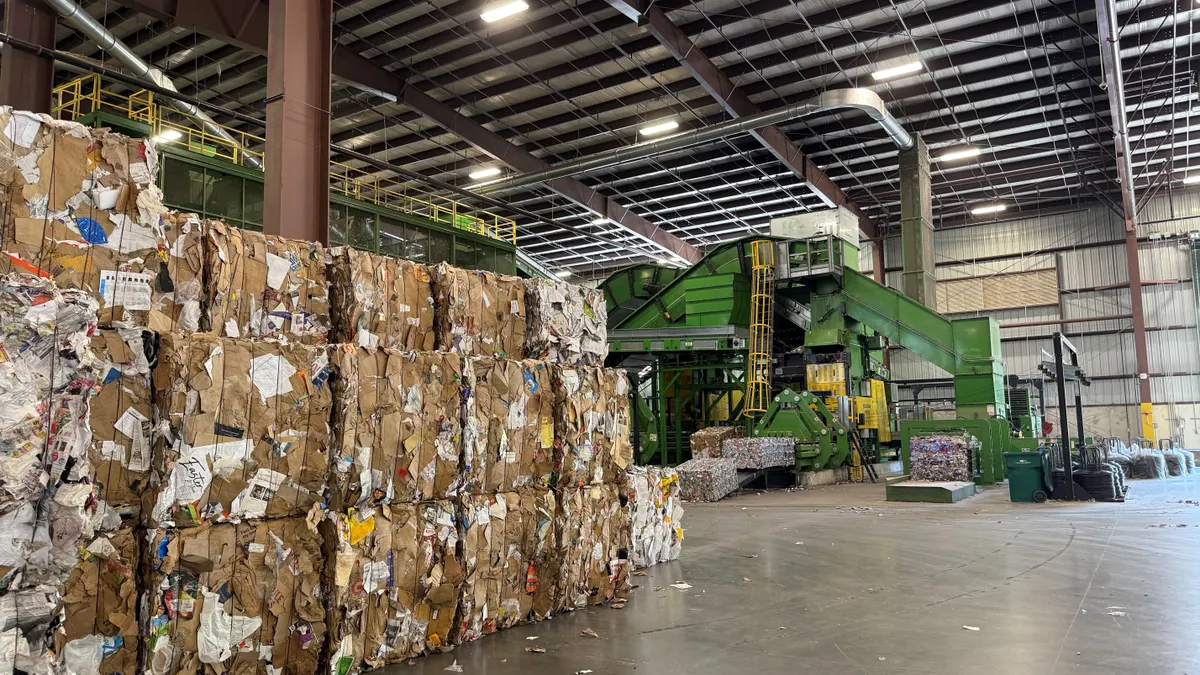Piled up garbage in Massachusetts. A landfill with a skeleton staff in California. Stalled recycling in Ohio.
Piece by piece, the International Brotherhood of Teamsters has waged the largest sanitation worker strike in a generation. Rather than a nationwide workforce deciding to walk out en masse, the 2025 Republic Services strike began in the suburbs of Boston with a regional contract.
It quickly spread via four additional contract disputes in communities around the country, with other Republic Services employees halting work in solidarity for two to three weeks. At its peak, the labor action involved more than 2,000 workers, and more than 450 are still picketing today in Massachusetts and Georgia.
Many of the striking sanitation workers feel the nation’s largest waste companies readily accepted the praise for their “essential workers” during the COVID-19 pandemic. But those workers sense a disconnect between the perception and their compensation today. Five years on, inflation has taken its toll on wages while executives have earned multimillion-dollar compensation packages and spent hundreds of millions on dividends and stock buybacks.
“After things got back to normal, it was just back to business. You're treated like a hydraulic hose. If you bust, we'll just get a new one,” Chuck Stiles, who has helped lead the Teamsters’ waste and recycling division since it was launched in 2006, said in an interview.
While pandemic lockdowns may have lifted, the public’s sympathy for the “essential worker” stuck. Local officials have largely weighed in on the side of the workers in the Republic conflict, even as trash piles up, blaming the hauler for stinky streets. Massachusetts Gov. Maura Healey has said the state of negotiations is “beyond untenable” and called for a meeting on Aug. 11 with Republic CEO Jon Vander Ark. The company later met with the governor’s staff, according to a Republic spokesperson.
The hauler insists it could meet the needs of its customers if picketing Teamsters didn’t slow down its trucks on the road. Republic said it has adjusted routes and brought in workers from other areas to maintain at least partial service. It also insists its latest offer of a 43% wage increase over five years and “zero-premium healthcare” surpasses its competitors in the market, which the union disputes.
“We understand the importance of our role in the communities we serve and are working hard to continue providing service,” Roman Blahoski, director of external communications for Republic, said in an emailed statement.
Waste collection is a difficult and dangerous job, and the Teamsters know that makes it hard for Republic to find workers. The union is betting the company’s industry-leading unionization rate, coupled with historically high public support for organized labor, will be enough to overcome the strength of a company with a $73 billion market capitalization.
But the Teamsters will need to overcome structural disadvantages in the contract negotiation process in order to succeed. As the standoff continues, both sides are eager to prove the balance of power in labor negotiations is now in their favor.
A simmering feud
It’s been 22 years since the industry saw this many workers strike at once, according to federal Bureau of Labor Statistics data. In 2003, the Chicago Area Refuse Haulers Association led a 3,300-worker strike, which lasted eight days. Teamsters led a sanitation strike in New Jersey in 1993 that involved about 1,800 workers. That strike ended after 11 days.
Other sanitation workers who are not Teamsters have also gone on strike this summer. That includes in Philadelphia, where nearly 1,300 sanitation workers joined AFSCME District Council 33's general municipal worker strike for about a week. In Ontario, 25 WM workers represented by Labourers' International Union of North America Local 493 went on strike in July and returned to work last week.
In Boston, the Teamsters’ strike has been particularly acrimonious since it began. In court filings, Republic detailed picketers allegedly yelling slurs and other foul language at the managers and "Blue Crew" employees it's called in from other markets to provide replacement service. Republic also alleges picketers slashed the tires of a rental van that was bringing in strike breakers and otherwise sabotaged equipment the hauler was attempting to use. The company has reported spending $100,000 per day on security for the workers it brought in, engaging both local police officers and the Pinkerton private security service.
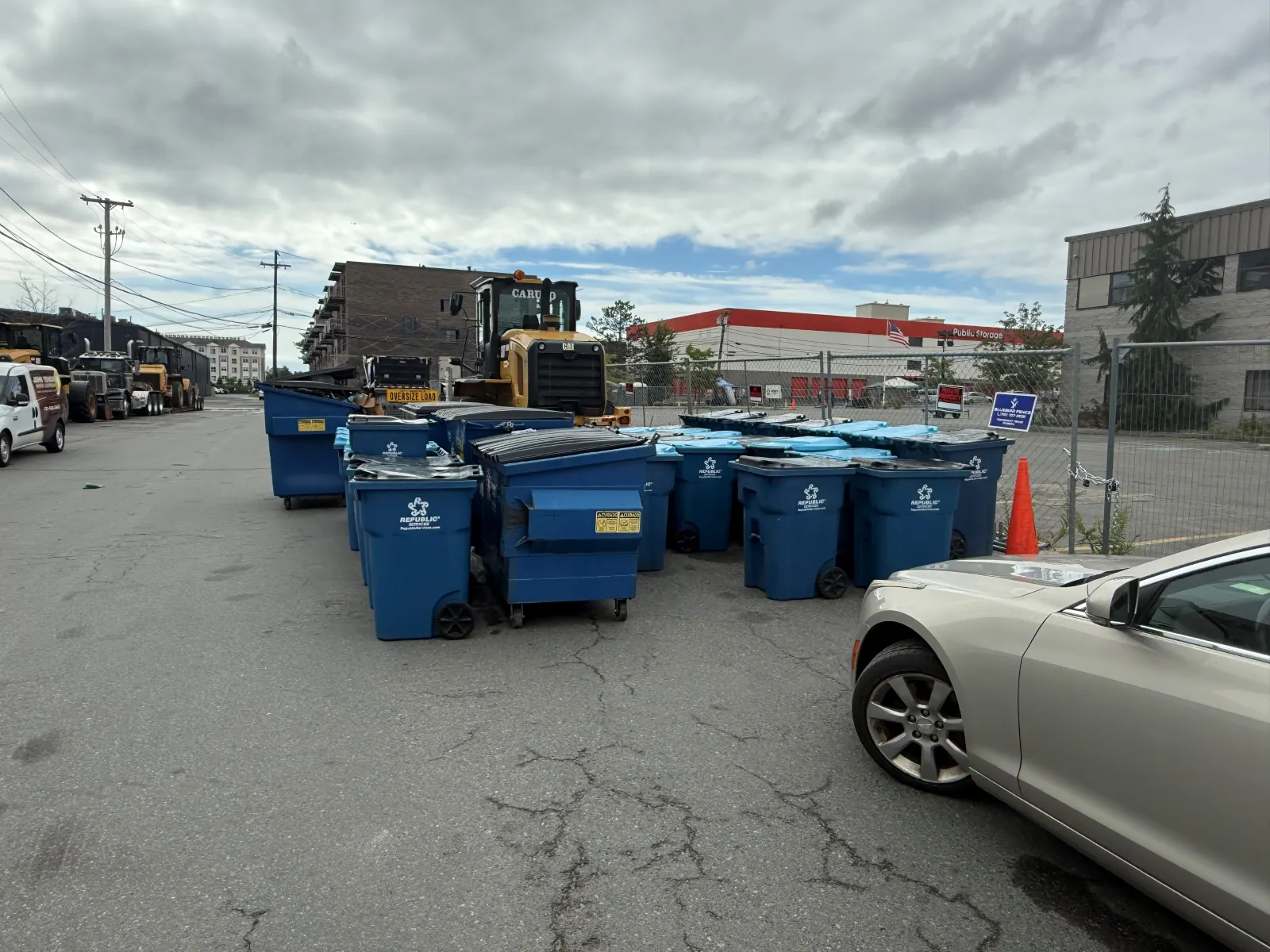
The Teamsters have succeeded in slowing down Republic, both through physical blockades and attrition. The union alleges Republic has only mustered up about half the labor force it typically needs to serve its Boston-area customers. Teamsters are also allowed to block trucks entering and exiting the company's facilities for a certain number of minutes as part of the picket. Then they must move, per First Amendment restrictions put in place by local police departments.
The Teamsters have denied any criminal wrongdoing during the dispute. They have also twice warded off Republic's attempts to have the court intervene on its behalf against the picketers. Republic recently filed a third attempt to receive an injunction against Teamsters from U.S. District Court Judge Brian Murphy, which remains pending.
This is not the first time the two sides have clashed. In 2019, Local 25 went on strike against Republic Services over a contract dispute. But the union was forced to retreat after a monthslong stalemate, finding affected Republic Services workers union jobs with other employers. Sean O'Brien, who is now the International Brotherhood of Teamsters' general president, led that strike as a regional officer.
The playing field has changed in the six years since that dispute. The number of Republic Services workers represented by Local 25 is now larger, in part thanks to industry consolidation. Republic Services acquired JRM Hauling and Recycling in 2022, bringing dozens of new workers into the union.
Meanwhile, the Teamsters have been laying the groundwork to enable a more aggressive negotiating strategy. When O'Brien was elected to lead the union, he prioritized an expanded fund that could lessen the financial risk of a major strike. The union also set up a waste-specific fund in recent weeks to cover striking workers' health benefits while they're off the job.
Teamsters chapters representing smaller Republic worker contingents have felt emboldened by the support they’ve received from the national organization.
“It’s an extremely powerful testament to the unity of Teamsters to see them rallying behind their brothers and sisters to say this needs to be corrected,” said Tony Seminary, vice president of Teamsters Local 179 in Ottawa, Illinois. The union represents about two dozen Republic Services workers who launched their own strike just hours after Local 25 made its announcement.
“It’s not about me, it’s about we, and together we can bring this corporate giant to its knees,” he added.
On Aug. 3, Local 25 voted to continue its strike by an even stronger margin than its initial vote. Other locals have said they're willing to remain off the job until Republic can agree to negotiate in good faith and accept more worker-friendly terms.
For the Teamsters, this summer’s strike has become personal. Leaders say Republic is uniquely difficult to negotiate with among its waste hauling peers, and they're fed up with the relationship the company has cultivated with its union-represented workers.
"I’ve been a Teamster for 37 years, I’ve negotiated many contracts, and Republic ... is the most difficult company to deal with," said Eric Massaro, a member of Teamsters Local 728 representing Republic workers in Cumming, Georgia. "This company would waste money and lose money rather than give these men and women the wages that they deserve."
A sympathetic public
Affected residents and local officials have also become frustrated with Republic. In Washington, a customer told local news station KIRO 7, “We all have to stick together.” In Massachusetts, the state’s entire congressional delegation called on Republic to resume negotiations with the striking Teamsters.
Fourteen Boston-area municipalities have seen trash and recycling service severely impacted by the strike. Six of those towns have taken Republic to court, alleging breach of contract and demanding compensation for lost service.
That case remains ongoing. Vander Ark said on the company’s second quarter earnings call that Republic was looking into “some credits we'll issue to customers in markets where they have had labor disruption.” He also said the company is "prepared for any scenario," including a prolonged strike.
"We're going to negotiate in good faith. We want a deal that is very fair and competitive for frontline people. But we're not going to do any deal that impairs the longer-term health of the business or hurts our colleagues longer term," Vander Ark said on the July 29 call.
But officials remain unsatisfied with Republic’s performance. The city of Boston has also seen some service impacts, and officials there have come out strongly in favor of the workers.
“Your inability to collect trash from your customers due to the ongoing labor dispute at Republic Services is taking an unacceptable toll on Boston’s residents, businesses, and neighborhoods,” Mayor Michelle Wu told Vander Ark in a July 23 letter. The same day, the city began issuing trash code enforcement fines directly against Republic rather than impacted businesses.
Both before and after the pandemic, support for unions among the general public has been rising, according to the left-leaning Economic Policy Institute. That coincides with a rise in labor actions within the waste and recycling industry, experts say.
“Workers feel like they should be paid a higher wage for dangerous, challenging work, and that's one of the reasons why we saw more strikes in 2023 and 2024 than we did in the pre-COVID years,” said David Biderman, a consultant and former head of the Solid Waste Association of North America. “I think there's a fair amount of sympathy for the sanitation workers and the hard job they have that didn't exist 10, 15 years ago.”
Among the country’s top five publicly traded waste companies, workforces generally have higher unionization rates than the sector at large — usually greater than 1 in 5 workers are union members. Republic has the highest unionization rate of them all.
Yet even when operating within a strongly unionized workforce, organized labor can face structural difficulties when it encounters a dispute with employers, according to EPI. The National Labor Relations Board, the federal agency in charge of mediating employer-employee disputes, can take months or years to adjudicate complaints. And large employers are often in a better financial position to endure a prolonged strike, said Steven Horowitz, an attorney who has represented waste companies (though not Republic) in labor disputes.
That makes public support all the more important if unions hope to prevail against their employers, Horowitz said.
“I do think it is pressure,” he said. “They're still in the business of customer satisfaction, and they have to pick up the garbage and do it in a way that satisfies their end user, which is the customer.”
Union officials have repeatedly brought up Republic Services’ financial performance in their public messaging, arguing workers deserve a larger piece of the pie.
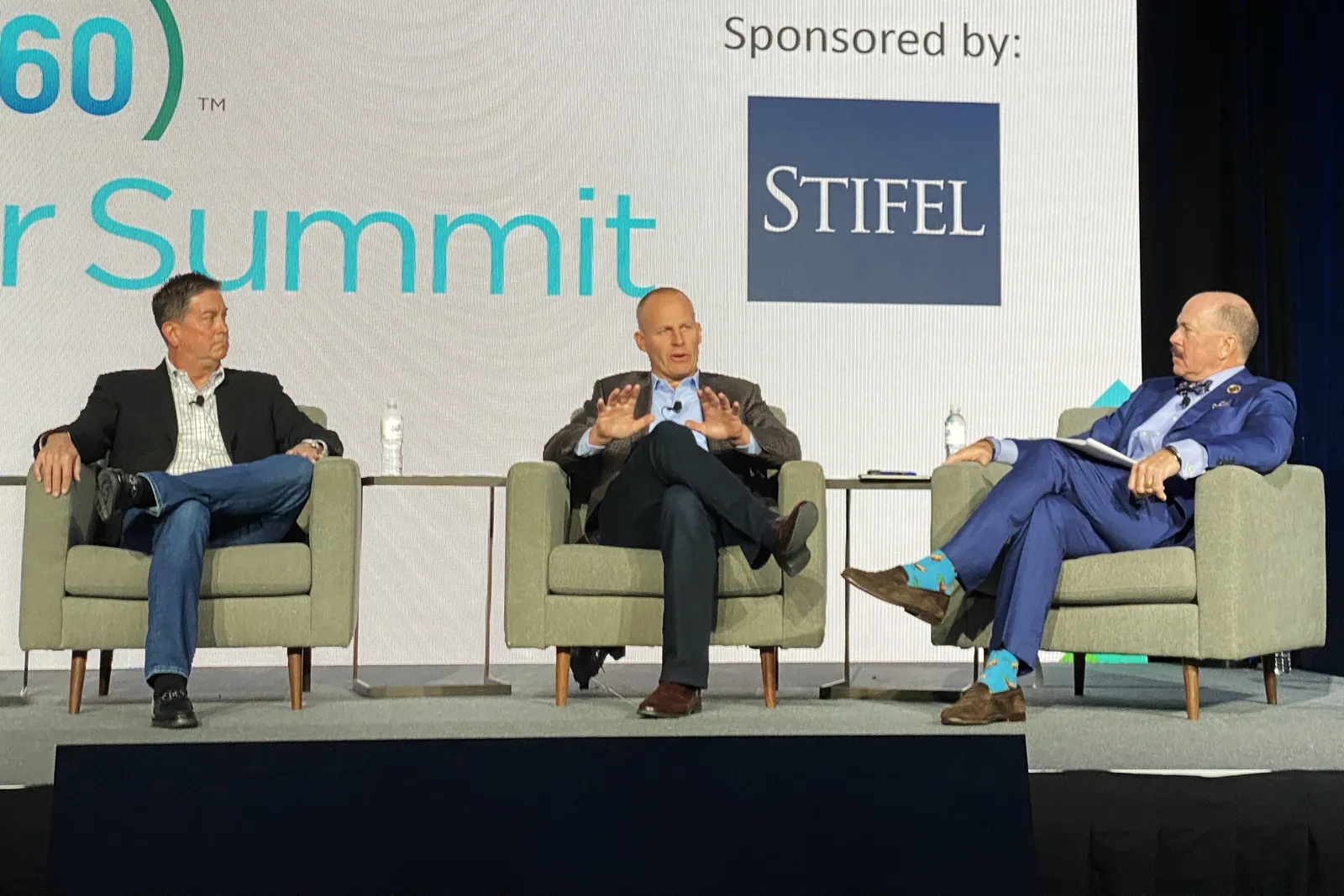
The company has spent $3.7 billion on share repurchases and dividends over the last four years, enriching shareholders. Vander Ark's total compensation was nearly $13 million in 2024, 153 times more than the median salary for a Republic employee. His compensation is also up considerably from 2021, the year he became CEO. That year, Vander Ark made more than $8.5 million.
Still, salaries for the average worker have also increased substantially at the company in recent years. In 2021, median employee compensation at Republic was $68,217. That number increased to $84,950 in 2024, which Biderman attributes to shifting dynamics within the labor market.
“I think the industry, generally speaking, has stepped up. I think what we're seeing now is that organized labor perhaps wants the continuation of that step up in terms of compensation,” he said.
Labor leaders say that the demand for higher wages is justified given what workers are asked to do. Refuse and recyclable material collector was the fourth most dangerous job in the country in 2023, the most recent year for which federal Bureau of Labor Statistics data is available. Workers often fight with employers over safety issues like malfunctioning trucks or extreme heat in the workplace.
Companies have struggled to find licensed truck drivers, leading some to commence their own training programs to help new and existing employees gain their license. The scarcity of talent has also caused pickup delays in pockets of the country in recent years, Biderman said. It’s become a leverage point in labor negotiations.
“Let's be honest, nobody wants to drive a truck nowadays, especially a garbage truck,” Stiles said. “These companies will have to start thinking about, why do we want to beat up on our workers when we should be working, collaborating together, so we keep these workers in the future?”
Stiles said employees have become “fed up” with large employers like Republic. But he said it’s up to the company to reset its approach to its employees and bring an end to the current strike.
“They're the ones that are causing these customers harm, causing these cities harm,” Stiles said. “It's not the Teamsters union, it's not our members, it is this corporation.”
A route forward
So far, Republic estimates it will lose $25 million to $50 million in 2025 as a result of the labor dispute, less than 1% of its adjusted full-year earnings. The hauler has plenty of cash to spend if it wants to wait out the dispute.
Republic, like other major companies in the industry, has amassed that kind of leverage through aggressive growth. Since 1992, public companies have increased their portion of U.S. waste and recycling revenue from about 41% to 64%, grabbing market share away from private companies and municipal agencies, according to Waste Business Journal. Revenues for those companies more than quadrupled over the same period.
John Gioia, a member of the board of supervisors in Contra Costa County, California, has seen the changes that come with consolidation firsthand. The county’s collection services were impacted by sympathy strikes for workers seeking a contract at Republic’s Forward Landfill in Manteca, an hour’s drive away.
Gioia said his constituents were largely supportive of the action. But he also noted this is the first local sanitation worker strike he can remember. Part of the reason for that, he thinks, is because the county’s waste collection was handled for decades by small, family-owned companies. It wasn’t until 2001, when Republic Services bought local hauler Richmond Sanitary Service, that the dynamic between worker and employer changed, he said.
“I think that was a big cultural shift,” Gioia said. “You would not have had a labor dispute like this when it was held by the family-owned business. It was a different relationship.”
In most markets, the summer Republic strike appears to be winding down. After Teamsters Local 439 in California and Local 252 in Washington reached tentative contract agreements in July, national leadership encouraged workers on the West Coast to come off the picket line and back to work. Stiles said that was a gesture meant in good faith to urge a resolution.
But tensions remain high in Massachusetts. The two sides have been working with a federal mediator for more than a month, but currently they have not set a next negotiation date. They last met on July 18.
What’s really at stake for Republic in Boston is its competitive position in a major market, said Horowitz. Local 25 wants Republic Services workers’ wages to match those of other haulers in the area. But if they do, then Republic will have to find other ways to keep the cost of its hauling contract lower than its competitors’ and outbid them in local contract negotiations, he noted.
The dispute may be a matter of each side waiting for the other to blink. Horowitz said the odds tip in an large employer’s favor the longer a strike drags on.
“If you can withstand a strike, you can negotiate forever,” he said.








